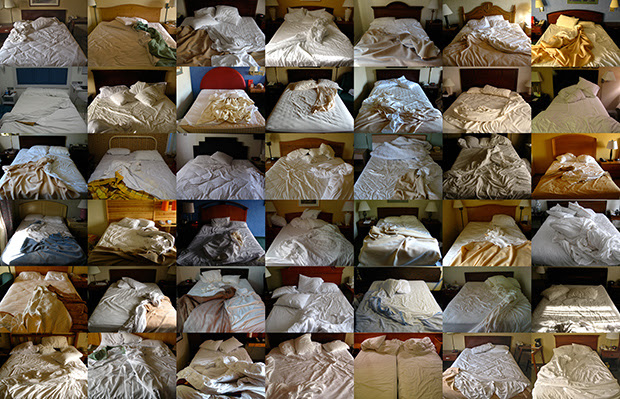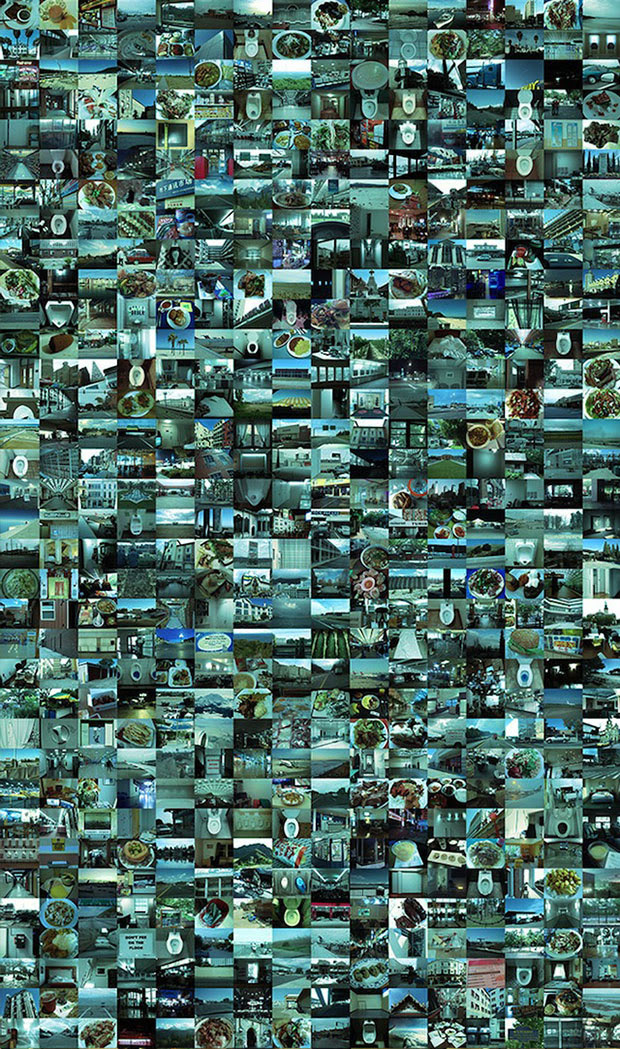Feature Shoot |
|
Posted: 11 Aug 2015 05:00 AM PDT
   “Once you’re wrapped up in a terrorism investigation, you never really escape from it,” says artist and University of Maryland professor Hasan Elahi of his experience as an innocent man under the scrutiny of the Federal Bureau of Investigation. In the summer of 2002, he arrived at Detroit airport after a trip to Senegal, where he found FBI agents waiting to interview him. It had been an anonymous tip, he says, that lead to the investigation, one that he hypothesizes came from the owners of a storage unit in Tampa for which he paid his final deposit on the day following the terrorist attacks of September 11th, 2001. Although the initial agent recognized that the artist was no threat, he was subjected to a procedure that included six months of more interviews and nine polygraph sessions, all of which he passed. When he was at last released from all suspicion, he continued to deal with a few inconvenient encounters with the Department of Homeland Security when he flew internationally, which he did quite often. The FBI agents with whom he had dealt invited him to update them on his movements so as to avoid any unnecessary hassles, and what began as a quick phone call here and there has evolved over the years into a collection of more than 72,000 cellphone photographs tracking his every step. The project, he admits, was born not so much of the creative impulse as from the simple and strategic approach to preventing any incidents and questioning in the future. They key to overcoming the feeling of being watched, he suggests, was to watch himself, and in so doing, to rob the authorities of control over surveying his life. His website tracks records and then archives the food he ingests, the restrooms he visits, the stores he frequents, and the airports he enters with timestamped images, all of which can be cross-referenced with his bank records and flight logs, all made public. The archive is updated many times each day. In making each and every minutia of his life accessible to everyone, Elahi indicates that he has actually secured his right to privacy. He alone is the one determining what’s seen, and what’s seen is available not only to the higher ups of the world but also to anyone with an interest. He floods us with information—meals on airplanes, signposts passed on the road, items bought from the grocery— and in doing so, he tells us nothing private or significant about himself or his life. By writing his own code, the photographer is able to identify who visits his website. Among the art enthusiasts, he’s logged clicks from the Department of Homeland Security, the National Security Agency, Pentagon, the CIA, the Executive Office of the President, and more bodies within the government. Since Elahi first embarked on what would become Tracking Transience, he says that others have been doing the exact same thing, if unconsciously. While it was awkward in the early aughts for him to take out his camera or phone at mealtimes or in train stations, it’s now become the norm; people like to chronicle their day-to-day whereabouts, and the photographer sees a direct correlation between the impulse to do so and the increased surveillance following the events of September 11th. We’ve taken to heart, he notes, that we’re always being watched, and—in either retaliation or compliance—we’ve started doing it to ourselves. A selection of images from Tracking Transience is now on view as Thousand Little Brothers as part ofMoving Walls 22: Watching You, Watching Me at Open Society Foundations.      All images © Hasan Elahi The post Photographer Gets Investigated for Terrorism, Responds in Best Possible Way appeared first onFeature Shoot. |
|
Posted: 10 Aug 2015 07:04 AM PDT
 Lupo © Seth Casteel Seth Casteel: I always struggle with a life-work balance. Even though my work is my passion, I don’t want to have a camera in my hand 24 hours a day. Sometimes I just want to take a time out and experience things with my eyes and not through the lens. But then I feel guilty sometimes because I’ve been given such an incredible opportunity – I want to make the most of it! I’m extremely proud of what I have accomplished thus far, but always wonder, could I have accomplished even more? Benjamin Lowy: Not being a hedge fund manager? I think not running an effective business straight from the get-go was mistake. But not the biggest. Probably thinking that I just had to be one kind of photographer, that I had to specialize. Ron Haviv: One of my great faults is thinking too much about whether I should go photograph a story or not. The best options are always to go with your gut feeling and start shooting. Wasma Mansour: While working on my Single Saudi Women project, I made the mistake of naively assuming something about a participant’s private life, which could compromise her reputation, based on clues I’ve gathered from her home and possessions. During the interview, I asked questions that alluded to my speculation. She was taken aback by it but graciously finished the interview. However, on the following day, she requested that we postpone the shoot to the day after. She subsequently ended the collaboration. Jenny Lewis: Looking back, I think I concentrated on getting commissioned work too much and didn’t have the balance of working on my own work, that of course is all linked with needing to make a living. The forced break by having children created a space for me to work on my own projects and made me fall in love with the medium again. Professional jealously and working in isolation can stunt enjoyment; I have really enjoyed being more open and sharing what I’m working on. People can watch the series grow on Facebook and Instagram, and I’ve found that interaction really positive and supportive. Corinna Kern: I don’t think there has been such a thing as a biggest mistake for me. Of course not everything worked out as planned, but that is an essential part of your learning process and advances you in your career. The only aspect I would have changed is that if I could rewind time, I would have started engaging in documentary photography and photojournalism much earlier. It was only while completing my Masters in Photojournalism in London 2013 that I came to experience the documentary side of photography as the most meaningful and powerful for me. Only then I realized that this is what I want to do in my life, be it for work or for personal projects. Carolyn Drake: I think the key is not to let mistakes torture you – all mistakes are small when you consider the bigger picture and in fact they usually leave you some place better. Laura Pannack: Not taking enough pictures. Diana Markosian: So many. Yet I don’t consider any of them ‘mistakes.’ They’ve been important moments of growth for me. Ed Thompson: If I answered that question honestly. Ayesha Malik: I focus more energy on making the work then I do on “selling” it. I have never been perfectly comfortable with marketing my work or myself. I am not built that way. It takes me time to reach a point where I feel comfortable putting work out. Maybe that is a good thing, to a certain degree, but I could absolutely do more of that. Erin Trieb: Honestly, as utilitarian as this sounds, not backing up my hard drives. I lost two drives simultaneously in 2011, and it took months and thousands of dollars to retrieve the images. Luckily, they were all saved. It was an incredibly stressful situation, and I learned that I’ll do anything to avoid that type of pressure again. Now I have three back up drives for every drive I own. But if we’re talking matters of the heart, I think my biggest mistake that I face still is dragging my heels when starting something new because of fear of failure or the unknown. I have to remind myself again and again that fear is simply a distraction that holds you back. J.M. Giordano: Taking time out to chase after the empty dreams of fashion and advertising. In the end, those genres mean little. I think the true power of photography is in documentary/photojournalism. Peter Dench: Oh must we go there! Each day is riddled with mistakes, misjudgments and making decisions that while made with the best intentions at the time, in hindsight turn out to be gross miscalculations. At the moment, I’m trying to train myself to be more open to new technologies and embrace their creative potential. My last assignment was using the new Periscope App for WIRED. Molly Landreth: I’ve made so many!! I’d say that one of my biggest regrets is not sending thank you notes and prints to the subjects right away after the shoot. When I first started out, I hated everything that I would shoot until months and months afterwards. I’d stick it in a drawer and not think about it, and then one day I’d pull it out and (like magic) I’d suddenly love it. So, I’d wait and wait to send people anything and sometimes I’d wait too long and they’d move, or I’d forget. I just feel terrible about that. Another huge mistake I made was collaborating with a good friend without clearly defined rolls, ideas of ownership or a contract. Collaborating is the best thing ever when it’s going smoothly, but when things go south and you haven’t protected your rights, it’s really heartbreaking and unproductive. You have to think like an artist and a business. Martin Usborne: Doubting myself too much. Cristina de Middel: I think all the mistakes I’ve made have brought me to the point where I am now and that I feel very comfortable in, so I guess I would repeat all those mistakes one by one. Making mistakes is the only genuine way to learn, and one should make a couple of mistakes a day just to practice. The post We Asked 17 Photographers About the Biggest Mistakes They’ve Made in Their Careers appeared first on Feature Shoot. |
